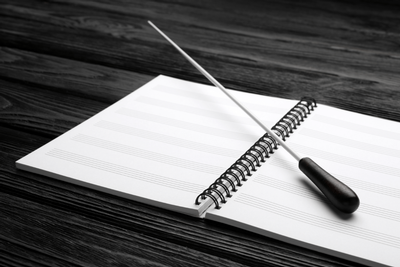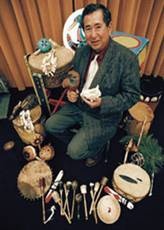The Edwin A. Fleisher Collection of Orchestral Music team is thrilled about Fort Smith Symphony Orchestra’s latest album, Louis Wayne Ballard: a stunning compilation of recorded performances of Louis W. Ballard’s music.
Ballard, who was of Quapaw and Cherokee descent, was a classically trained musician who never relinquished his deep love and pride for his cultural heritage. Born in 1931 in Devil’s Promenade, Oklahoma, Ballard left a catalog of materials that centered and uplifted Native American culture and history and they are kept here in the Fleisher!
Fort Smith Symphony Music Director, John Jeter, borrowed Ballard’s music from our collection to record the album. Fleisher Collection Curator, Dr. Gary Galván, Ph.D., worked with the Fort Symphony Orchestra to prepare the Ballard orchestral sets for recording. I had the pleasure of interviewing Gary on his experiences working to bring Ballard's work into the mainstream. The conversation has been lightly edited for clarity. Enjoy!
How was the Ballard catalog acquired? How long have we had it in our collection?
Dr. K. Erik Ettinger who wrote his 2014 dissertation on Louis W. Ballard’s life as a composer and educator helped the family organize and move the orchestral music to Illinois where Ballard’s son, Louis A., lived. Louis A. was focused on preserving his father’s legacy. Dr. Ettinger knew what the Fleisher did and reached out to ask if we could help. In 2017, the family granted us broad permissions to do anything necessary to keep the music in circulation, and nine works came to us then. Two more have been added since that time.
When did interest in the Fleisher’s Ballard catalog increase?
Ballard has always had a modicum of success. He was well-educated, earning degrees in music at the University of Tulsa, and is celebrated as the first Native American to obtain a graduate degree in Composition. He became an authority and advocate for Native American arts. His rise in a world where diversity is becoming increasingly important was inevitable. Here at the Fleisher Collection, we are in a special position to promote his music on the worldwide stage.
What challenges did you face preparing the work for recording?
The materials we received consisted largely of scores and parts in the composer’s manuscript and had been used in performances, so they were marked up with edits from both the composer and the performers. His manuscript was very neat, but parts of the works were not always laid out with the best page turns; musicians on stage do not want to be turning pages in the middle of musical phrases.
We worked with Dr. Ettinger and Ballard’s granddaughter, Simone, to help facilitate conductor John Jeter’s recording project with the Fort Smith Symphony on the Naxos label. We specifically re-engraved two of the works for the concert and recording sessions and scanned, cleaned, and reprinted a third set for the project.
It takes time to properly re-engrave and edit a score and parts — sometimes a year or more. Trying to get the works ready for the rehearsals leading up to the recording session can be challenging. Everything has to be well-coordinated.
How does it feel to know that Fleisher is the only repository that has Ballard’s manuscript catalog?
I have called Fleisher "the Alexandria of orchestral music," and I take great pride in being part of a team that gets the page to the stage for performances all over the world. Our dedication to diversifying and decolonizing the orchestral stage is a particular blessing and my favorite part of the mission.
Ballard composed orchestral music, arranged music for the ballet Four Moons and so much more. His efforts have helped elevate Indigenous communities, histories, and cultures. He’s paved the way for other classical Native American musicians including R. Carlos Nakai and projects such as Nkwiluntamen. In his interview on Classical Tulsa, John Jeter, Fort Smith Symphony Orchestra's Conductor and Music Director, describes one of Ballard’s songs “Devil’s Promenade” as having a lot of drive, edge, and energy.
The piece opens with an eagle bone whistle — an Indigenous instrument — and you’ll immediately hear drumming… there’s all sorts of Indigenous percussion in the work.” (Heilman, 2023)
Check it out on our Spotify playlist and explore our Ballard-related recommendations.
We are proud that the work of highly esteemed artists such as Ballard can be circulated from the Fleisher Collection!
Have a question for Free Library staff? Please submit it to our Ask a Librarian page and receive a response within two business days.


